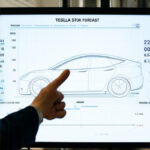The Impact of TSLA’s New Technologies on the Automotive Industry

Introduction to TSLA’s Innovative Technologies
TSLA has been at the forefront of innovation, revolutionizing the automotive industry with cutting-edge technologies. From electric vehicles (EVs) to autonomous driving systems, TSLA has consistently pushed the boundaries of what is possible. This blog post explores the impact of TSLA’s new technologies on the automotive sector, highlighting their advancements in various domains. Understanding these changes is crucial for appreciating the role of innovation in shaping the future of transportation and the automotive industry as a whole.
Overview of TSLA’s Technological Advancements
TSLA’s technological advancements encompass a wide range of areas including electric drivetrains, battery technology, autonomous driving, and artificial intelligence (AI). Their relentless focus on research and development has resulted in several groundbreaking innovations. TSLA’s vehicles are equipped with state-of-the-art hardware and software that enhance performance, safety, and user experience. These advancements not only provide a competitive edge but also set new benchmarks for the entire automotive industry.
Importance of Innovation in the Automotive Industry
Innovation plays a pivotal role in the automotive industry by driving progress, improving efficiency, and enhancing sustainability. Companies like TSLA are at the helm of this transformation, introducing technologies that redefine mobility. The traditional automotive landscape is evolving rapidly, with a shift towards greener, smarter, and more connected vehicles. TSLA’s commitment to innovation has catalyzed this change, compelling other manufacturers to follow suit and invest in new technologies to stay relevant in a competitive market.
Electric Vehicles (EVs): TSLA’s Revolution
TSLA’s Market Dominance in EVs
TSLA has established itself as a leader in the EV market, commanding a significant share and setting trends in electric mobility. Their range of EVs, from the Model S to the Model 3, has gained widespread popularity due to their impressive performance, long-range capabilities, and sleek design. TSLA’s success in the EV segment has spurred increased consumer interest and acceptance of electric vehicles, paving the way for a more sustainable future.
Innovations in Battery Technology
One of TSLA’s most notable contributions to the automotive industry is their innovation in battery technology. The development of efficient, high-capacity batteries has been instrumental in extending the range and reducing the cost of EVs. TSLA’s Gigafactories play a crucial role in this, mass-producing advanced batteries that power their vehicles. These advancements in battery technology not only benefit TSLA but also have a positive impact on the entire EV market, encouraging other manufacturers to invest in similar technologies.
Impact on Traditional Combustion Engines
The rise of TSLA and their electric vehicles has had a profound impact on traditional combustion engines. As consumers become more environmentally conscious, the demand for fossil fuel-powered vehicles is declining. TSLA’s success has accelerated the shift towards electrification, prompting legacy automakers to rethink their strategies and invest in EV development. This transition is reshaping the automotive industry, with a growing focus on sustainability and reducing carbon emissions.
Autopilot and Full Self-Driving (FSD) Systems
Introduction to TSLA’s Autopilot Features
TSLA’s Autopilot and Full Self-Driving (FSD) systems are at the cutting edge of autonomous driving technology. These systems leverage a combination of cameras, radar, and advanced algorithms to enable semi-autonomous and fully autonomous driving capabilities. Features such as lane-keeping, adaptive cruise control, and automated parking enhance the driving experience and improve safety. TSLA’s vision for a future with self-driving cars is a testament to their innovative spirit and commitment to advancing mobility.
Safety and Regulatory Considerations
While TSLA’s Autopilot and FSD systems offer significant benefits, they also raise important safety and regulatory considerations. Ensuring the reliability and safety of autonomous vehicles is paramount, and TSLA continuously updates their software to address potential issues. Regulatory bodies are also working to establish guidelines and standards for the deployment of self-driving cars. TSLA’s proactive approach to safety and collaboration with regulators is crucial in gaining public trust and facilitating the adoption of autonomous technologies.
Competitors’ Response to TSLA’s FSD
TSLA’s advancements in autonomous driving have prompted competitors to accelerate their own development efforts. Traditional automakers and tech companies alike are investing heavily in autonomous vehicle technology to compete with TSLA. This competition is driving innovation across the industry, leading to more advanced and reliable self-driving systems. TSLA’s pioneering work in this field has set a high standard, pushing the entire industry towards a future where autonomous vehicles are commonplace.
TSLA’s Impact on Automotive Sustainability
Reduction of Carbon Footprint
One of the most significant impacts of TSLA’s technologies is the reduction of the automotive industry’s carbon footprint. By promoting the adoption of electric vehicles, TSLA is helping to decrease reliance on fossil fuels and reduce greenhouse gas emissions. Their commitment to sustainability extends beyond vehicles to include energy-efficient production processes and the use of renewable energy sources in their operations. TSLA’s efforts are contributing to a greener and more sustainable future for the automotive industry.
Collaboration with Renewable Energy Sources
TSLA’s vision for a sustainable future includes collaboration with renewable energy sources. Their solar products, such as Solar Roof and Powerwall, complement their EV offerings by providing clean energy solutions for homes and businesses. This integration of renewable energy with electric mobility creates a holistic approach to sustainability. TSLA’s innovative energy products not only support their mission but also encourage consumers to adopt renewable energy, further reducing the environmental impact of transportation.
Future of Sustainable Transportation
TSLA’s commitment to sustainable transportation is shaping the future of the automotive industry. Their continuous innovation in EVs, energy storage, and renewable energy integration sets a benchmark for other manufacturers. As the world moves towards greener alternatives, TSLA’s technologies will play a crucial role in driving this transition. The future of transportation looks promising, with sustainable solutions becoming more accessible and efficient, thanks to TSLA’s pioneering efforts.
The Role of TSLA’s AI and Machine Learning
AI Integration in Vehicle Operations
TSLA’s integration of AI in vehicle operations is revolutionizing the way cars function. AI algorithms enhance various aspects of the driving experience, from optimizing energy consumption to improving navigation and safety features. The use of AI enables TSLA vehicles to learn and adapt to different driving conditions, providing a more intuitive and efficient driving experience. This advanced technology sets TSLA apart from traditional automakers and underscores their commitment to innovation.
Machine Learning for Predictive Maintenance
Machine learning plays a vital role in TSLA’s approach to vehicle maintenance. By analyzing data from sensors and other sources, TSLA’s systems can predict potential issues before they become critical. This predictive maintenance capability helps to minimize downtime and reduce repair costs, enhancing the overall ownership experience. TSLA’s use of machine learning for maintenance is a prime example of how advanced technologies can improve vehicle reliability and customer satisfaction.
Enhancements in User Experience
TSLA’s AI and machine learning technologies significantly enhance the user experience. Features such as personalized settings, voice commands, and over-the-air updates provide a seamless and convenient driving experience. TSLA’s commitment to continuously improving their software ensures that customers benefit from the latest advancements. These enhancements not only make driving more enjoyable but also set a new standard for what consumers can expect from their vehicles.
TSLA’s Influence on Automotive Market Trends
Shift in Consumer Preferences
TSLA’s innovative technologies have led to a significant shift in consumer preferences. As more people become aware of the benefits of electric vehicles and autonomous driving, the demand for these features is increasing. TSLA’s success has demonstrated that consumers are willing to embrace new technologies that offer improved performance, safety, and sustainability. This shift in preferences is reshaping the automotive market, with a growing focus on advanced and eco-friendly vehicles.
Changes in Automotive Manufacturing Standards
TSLA’s advancements are also influencing automotive manufacturing standards. The company’s emphasis on quality, efficiency, and sustainability sets a benchmark for the industry. TSLA’s Gigafactories, which streamline production processes and reduce costs, are a model for modern manufacturing. As other automakers strive to compete, they are adopting similar practices and standards, leading to overall improvements in the industry. TSLA’s impact on manufacturing extends beyond their own operations, driving positive change across the sector.
Influence on Global Automotive Policies
TSLA’s technologies and their focus on sustainability are influencing global automotive policies. Governments and regulatory bodies are recognizing the need to support the transition to electric vehicles and autonomous driving. TSLA’s success has highlighted the importance of innovation in achieving environmental goals and improving transportation systems. As a result, policies are being developed to encourage the adoption of EVs, invest in charging infrastructure, and support research in autonomous technologies. TSLA’s influence is contributing to a more forward-thinking and sustainable approach to automotive regulation.
Economic Implications of TSLA’s Technologies
Job Creation in the EV Sector
TSLA’s growth and innovation are creating numerous job opportunities in the EV sector. From engineering and manufacturing to sales and service, TSLA’s expanding operations require a diverse workforce. This job creation extends beyond TSLA, as the demand for EVs drives growth in related industries such as battery production, renewable energy, and charging infrastructure. TSLA’s impact on employment is a testament to the economic benefits of transitioning to a more sustainable automotive industry.
Investment Opportunities and Stock Market Impact
TSLA’s technological advancements and market success have made it an attractive investment opportunity. The company’s stock has experienced significant growth, reflecting investor confidence in their vision and execution. TSLA’s influence on the stock market extends to other companies in the EV and tech sectors, as investors seek to capitalize on the shift towards sustainable and advanced technologies. TSLA’s impact on the financial landscape underscores the economic potential of innovation in the automotive industry.
Long-term Economic Benefits
The long-term economic benefits of TSLA’s technologies are substantial. By reducing reliance on fossil fuels and promoting sustainable practices, TSLA is contributing to a more resilient and sustainable economy. The transition to electric vehicles and renewable energy has the potential to reduce energy costs, improve public health, and create new industries and job opportunities. TSLA’s innovations are driving economic growth and sustainability, setting the stage for a prosperous future.
Future Prospects and Challenges
Upcoming TSLA Technologies
TSLA’s commitment to innovation means that new technologies are always on the horizon. Upcoming advancements include improvements in battery technology, the expansion of autonomous driving capabilities, and the development of new vehicle models. TSLA’s continuous investment in research and development ensures that they remain at the forefront of the automotive industry. These future technologies hold the promise of further enhancing performance, safety, and sustainability.
Potential Regulatory Hurdles
As TSLA continues to innovate, they may encounter regulatory hurdles that could impact the deployment of new technologies. Ensuring compliance with safety and environmental standards is essential, and navigating the regulatory landscape requires collaboration with government bodies. TSLA’s proactive approach to regulatory challenges, including working with policymakers and participating in industry forums, is crucial for overcoming potential obstacles. Addressing these challenges will be key to the successful implementation of future technologies.
The Road Ahead for the Automotive Industry
The road ahead for the automotive industry is shaped by TSLA’s innovations and the broader shift towards sustainability and advanced technologies. As electric and autonomous vehicles become more prevalent, the industry will continue to evolve. TSLA’s influence will likely drive further advancements in battery technology, AI, and manufacturing processes. The future of the automotive industry is bright, with the potential for safer, more efficient, and environmentally friendly transportation solutions thanks to the pioneering efforts of companies like TSLA.

Laura Henderson is an enthusiast and has been writing on cutting-edge topics for years.







